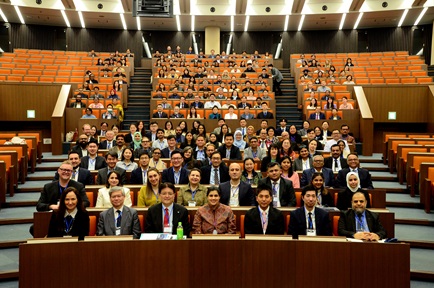Producing the next Gordon Ramsay in a Singapore hospitality school
The Republic should seriously explore offering top-class hospitality education to give this key sector a leg-up.
One of the best French meals in Singapore can be found at Chez West, a hidden gem offering dishes like grilled octopus with Provencal vegetables or monkfish with a miso glaze.
Yet, chances are you've never heard of this restaurant. Chez West isn't located in a high-end mall but at the Institute of Technical Education (ITE) in Choa Chu Kang.
Here, apprentices enrolled in the culinary programme craft exquisite meals as part of their training. Whenever Chez West announces its annual opening to coincide with the school term, reservations sell out quickly.
Singapore has several pockets of hospitality excellence
On the cocktail bar scene, establishments such as Jigger and Pony or Atlas consistently feature on the list of Asia's best bars. The city-state is also home to several Michelin-starred restaurants.
Singaporeans take immense pride in their local cuisine, and discussions about the future of hawker food leave no one indifferent.
The hospitality industry is also a cornerstone of Singapore's economy and culture.
In 2023 alone, it brought in $1 billion in monthly sales. Around 5 per cent of the workforce is employed in this sector, which is central to Singapore's identity, tourism campaigns and vibrant food culture.
Areas like the Central Business District showcase this transformation into a global culinary hub, blending multi-ethnic roots with expatriate influences.
Luxury hotels in Singapore are thriving, with occupancy rates nearing 80 per cent and revenue per room consistently on the rise.
Major events such as the Taylor Swift concerts and other high-profile performances are boosting hotel revenues, fuelling the growth of the hospitality sector.
Challenges for the hospitality industry
While the hospitality industry continues to expand, it is also facing significant challenges. To start with, labour shortages remain a constant struggle, driven by long hours -- averaging 48.2 hours a week in 2019 -- and low median pay at $2,300.
Strict foreign labour policies have further compounded the issue, leaving many smaller businesses struggling to fill roles. While the sector has bounced back post-pandemic, these challenges make it tough to sustain a stable workforce.
In addition, Singapore's image as a global city doesn't quite match how service jobs are perceived locally. These roles are often seen as low-value and unappealing.
A 2023 Institute of Policy Studies study found that service workers were far less likely than professionals, managers, executives and technicians to find their work meaningful or experience upward mobility.
This stigma is deeply ingrained: In 2012, service crew jobs were even ranked the "worst career choice" in Singapore.
The perceptions persist today, as highlighted by an anecdote where a steakhouse customer told their child, "Study hard so you won't end up like him", referring to their server.
On the customer side, the 2022 Customer Satisfaction Index of Singapore survey highlighted a notable decline in satisfaction within the food and beverage sector compared with 2021.
Respondents frequently cited issues such as less approachable staff and poorer experiences with ordering and service processes, indicating areas for improvement.
Some of these issues have to do with the way Singaporeans look at service and serving. When it comes to service, Singapore often prioritises efficiency over experience or craft.
Many consumers believe better customer experiences come from more app-based services
There has also been a push at the Government for more automation and efficiency. Through grants, F&B businesses have heavily invested in automation and software.
At the same time, Singaporeans also value meaningful human interactions and a personal touch in service. The emergence of themed restaurants reflects this desire for conviviality and connection.
At Secret Supper, a dining society that organises exclusive pop-up dinners, diners gather around a communal table to enjoy a carefully prepared meal from a particular part of the world while the hosts share stories about the region being explored that evening.
Singaporeans also value craftsmanship and expertise. Many of them travel to Japan to visit world-class sushi restaurants there, as they are attracted by the attention to detail and high standards of service.
This shows a clear tension between the push for more transactional service on the one hand, and the personal, experiential touch needed to upgrade the industry.
Switzerland as a model
To sustain the growth of the hospitality industry and improve service standards, Singapore needs to rethink the hospitality industry and, in particular, hospitality training. With the strong growth in tourism and hospitality, Singapore needs to invest in developing a skilled hospitality workforce that can provide exceptional service.
What if Singapore became a centre for hospitality education in Asia, much like Switzerland is for Europe? What would this mean for the hospitality ecosystem in Singapore?
Like Singapore, Switzerland is a small country of about 8.7 million people. And very much like Singapore, the country punches above its weight in a number of sectors, such as finance or pharmaceuticals.
Another area of excellence in Switzerland is hospitality education. Switzerland is widely recognised as a global hub for hospitality education, with institutions such as Glion, Les Roches or the Ecole hoteliere de Lausanne (EHL) setting the gold standard.
At these schools, students combine theoretical courses with intensive, practical training. At the EHL in Zurich, for example, students can work at the Berceau des Sens, a Michelin-starred restaurant, where they learn what it takes to provide impeccable service.
The excellence of Swiss hospitality education has its origins in the long history of tourism in Switzerland.
In the 19th century, Switzerland became a must-visit destination for wealthy European travellers attracted by its breathtaking landscapes. As a result, the country developed world-class hotels and established the world's first hospitality schools, creating a legacy of expertise that continues to this day.
While Singapore lacks this historical foundation, it has much to learn from Switzerland's model of integrating tourism growth with hospitality education, especially the focus on applied learning.
Hospitality as an opportunity
Singapore has a golden opportunity to elevate its hospitality sector as a key pillar of its economy and culture.
As Asia takes centre stage in global tourism, Singapore could lead the way in reshaping how front-line service roles are perceived -- turning them into careers that are both desirable and respected.
Achieving this would require practical steps like offering better pay and creating real pathways and opportunities for workers to climb the ladder into management or leadership roles.
For example, mentorship programmes could support waiting staff to grow into restaurant managers, while certifications in hospitality and the culinary arts could unlock new career opportunities and improve job prospects.
Another approach could involve integrating F&B facilities within institutes of higher learning, creating spaces where students can learn and work simultaneously.
Alternatively, Singapore could establish a dedicated hospitality and culinary arts institute in a central location, offering professional training alongside practical experience.
These establishments would be run and staffed by trainees working under the guidance of their mentors, providing hands-on opportunities to develop skills while contributing to the industry.
While EHL and other foreign hospitality schools have recently set up campuses in Singapore, the country has immense potential to further develop its own centre of excellence in hospitality education.
For instance, hotel and tourism school Shatec has trained students from around the world in Singapore for over 40 years. Since 1993, it has also licensed its hospitality and culinary courses to schools in countries such as Sri Lanka and Thailand. More establishments such as these could make the difference.
There is plenty of hope for the hospitality sector in Singapore. One of our favourite cafes in Singapore is Nickel, a beautifully designed establishment headed by baker-owner Lee Yin Quan. Every day, Lee and his team make some of the best cakes you'll find in Singapore -- a zesty lime and almond tart or a gorgeous pistachio mousse.
Lee, who is also Nickel's founder, acquired his skills by attending Ferrandi, one of the best Parisian culinary schools. At Ferrandi, students improve their craft under the guidance of top French chefs and get to hone their craft in Michelin-starred restaurants.
In the future, though, there's no reason why Lee and others like him should have to go all the way to Paris for high-quality hospitality training. We believe hospitality could -- and should -- be one of the key drivers of Singapore's economy. While technology and finance will continue to play significant roles in elevating Singapore's economic standing, we also need to develop a range of opportunities for young Singaporeans, including world-class hospitality options.
With the right investments in education and the promotion of excellence in hospitality, Singapore could become an Asian leader in hospitality excellence.
Julien Cayla is associate professor of marketing at Nanyang Business School. Shane Pereira is research associate at the IPS Social Lab, Institute of Policy Studies, National University of Singapore.
Source: The Straits Times







